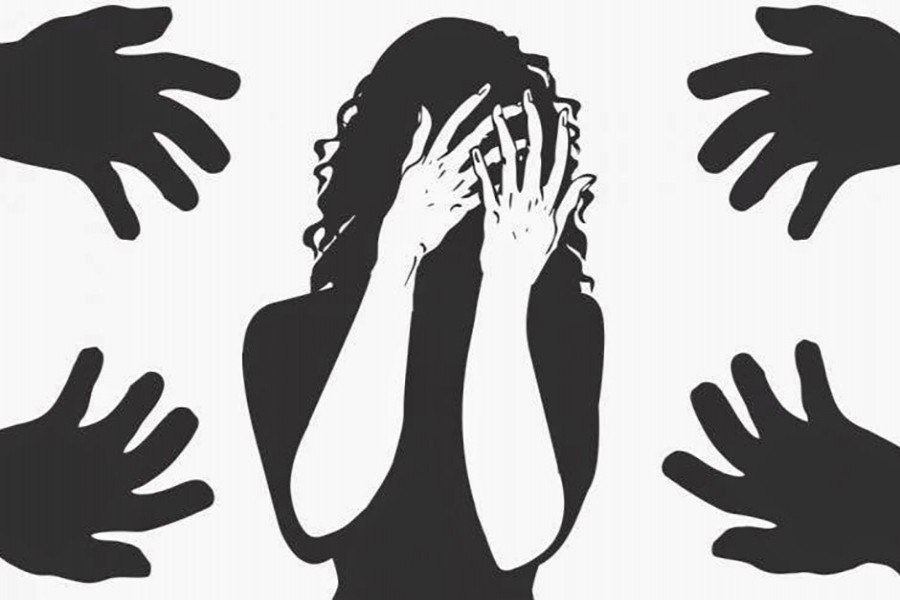The arrest of the driver, conductor and helper accused of attempting to sexually harass a female student of the Uttara University on a moving bus has brought to an end the non-stop protest steered by students of that university. Theirs was a peaceful protest but firm enough to drive their point home. All they did was quarantine 35 buses of the operating bus company and declare that unless the culprits responsible for the sexual harassment attempt were arrested, those buses would not be released. On Monday night the three accused were arrested and the agitating students handed the buses over to the police.
What is important here is that the protesters received support from the university administration and students from other universities as well. The media also played a supportive role. Although people from different walks of life did not raise their voice against the attempted harassment, understandably their moral support was behind the victim and her fellow students of that university.
Where the three bus operators would have stopped is anybody's guess. So daring was the conductor that he even held the girl by the hand in order to stop her from alighting from the bus. She was lucky that the traffic jam near a market complex slowed the speed and had the courage to make her way by delivering powerful pushes to the conductor and helper obstructing her exit through the door of the vehicle.
In a similar incident, a girl student of the Eden College had to fight her way out of the bus when the bus started moving on a route not designated for it. She could as well end up as a victim of sexual violence had she not the presence of mind before it was too late. In that case, her post on a social site drew the attention of the police. It was refreshing to see that the law enforcers took pains to locate her and gather information on the incident. The police succeeded to identify and arrest the culprits by talking to the management of the bus company which readily cooperated with them. The initiative by the law enforcement agency here is quite appreciable.
What is troubling, though, is that the ugly tendency is catching up with the operators of public transports. Since the rape and murder of Rupa on a moving bus at Gazipur, the tendency is on the rise. At least two women, one of them a garments worker, were raped on a moving bus on Savar-Aricha highway. Another garments worker was raped similarly on Fatullah-Narayanganj road. In two separate incidents on city roads, a female student of Bangladesh Leather Technology Institute and two other women were subjected to attempted sexual harassment on board two buses of two different companies in the current month and March respectively.
With many of the drivers and their associates, it has almost become a psychological disorder. But when a driver of the Bangladesh Petroleum Exploration and Production Company (BAPEX) exhibits similar mentality, there are reasons to believe that the psychological malaise has its origin in the social order here. Rape not only of women and adult girls but of children of as tender age as four to eight is so widespread that the bus operators dare consider a lone woman or girl passenger their easy prey.
The BAPEX driver was desperately driving his vehicle and the female student of a private medical college survived a close shave. When her friends stopped the bus after the near accident, she got on board the bus to enquire about the crazy driving. Not only did the driver misbehave with her but also called on his people from the BAPEX, who assaulted her two friends beside harassing her. A police officer arrived there and knowing all about the incident told the driver to ask for forgiveness. The reply from the driver was stunning, "I can't seek apology from a woman by touching her feet".
This is where the mentality has gone debased. The police officer should have retorted if her mother was not a woman. Family and society must share the responsibility of not inculcating in children the sense of respect for women. In the Rupa rape and murder case, four bus operators have been awarded death penalty and another seven years' imprisonment. This should have acted as a deterrent in a normal society. But today's society by any means cannot be said to be normal.
Usually the process of meeting out justice is long and time consuming. In the Rupa case, the trial was quite speedy but the accused will move for review in higher courts and the execution cannot be completed immediately. Then again, law against sexual harassment is totally absent. It is because of this, no stringent punishment can be meted out to the perpetrators. Rising incidence of this social malaise demands that a law is framed in order to award appropriate punishment to the perpetrators.
This legal deterrent must be complemented by a social campaign aimed at creating an awareness of gender parity based on respect to each other at all levels of society as well as resisting the predators. People with history of abuse can easily be blacklisted and dealt with accordingly if society puts its acts together.


